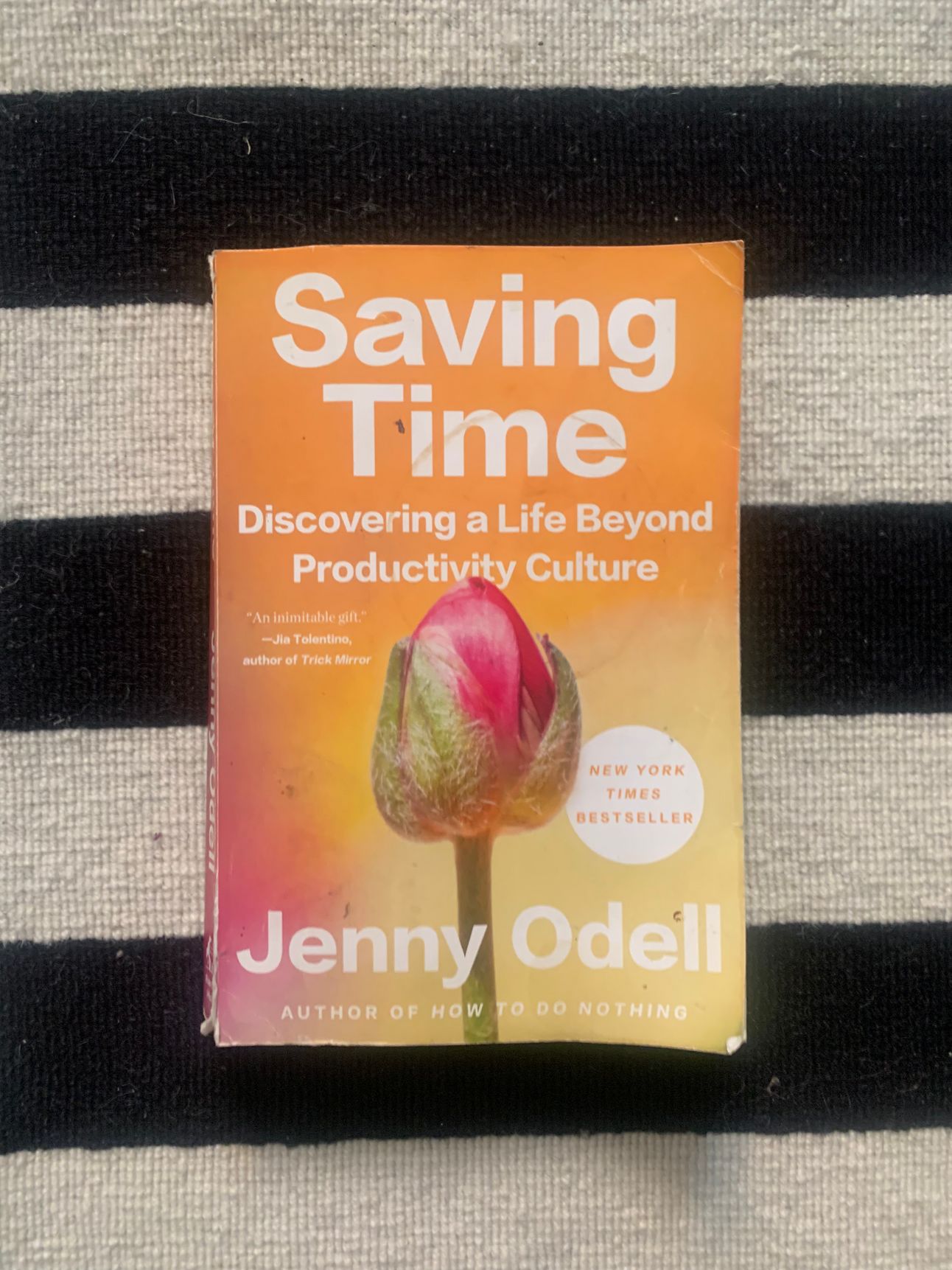Decode the Zeitgeist with 1440
Every week, 1440 zooms in on a single society-and-culture phenomenon—be it the rise of Saturday Night Live, Dystopian Literature, or the history of the Olympics—and unpacks it with curiosity-driven rigor. You’ll get a concise read grounded in verified facts, peppered with thought-provoking context and links for deeper exploration. No partisan angles, no fear-mongering—just the stories, trends, and ideas shaping how we live, work, and create.
In the Bolivian Andes, there’s a road called El Camino de la Muerte—The Death Road. It’s so narrow and deadly, drivers pray before starting.
Which is also how most freelancers feel before checking their bank accounts..
📩 In Today’s Email
TL; DR - This week we reclaim time, rebel against the grind, and launch a podcast from the edge.
The Deep Dive – The Clock is a Waste of Time: From high school detentions to Lil Wayne’s jet lag, we explore how industrialized time hijacked your life.
The Read – Saving Time by Jenny Odell: A haunting, high-IQ takedown of hustle culture disguised as a meditation on birdwatching.
The Stream – Long Fuse Short Fuse, Episode 1: The debut of my new podcast with a hilarious, high-voltage Navy vet. We go deep on AI chaos, Medellín, and modern madness.

Wealthy Americans are flooding New Zealand with applications after it loosened its Active Investor Plus visa. 189 Applications submitted in less than three months. The price of freedom? A few million and a good investment firm.
New EU Border Rules Coming: Starting later this year, non-EU travelers will need pre-clearance via the ETIAS system—a kind of mini-visa for short stays. If you’re planning a Schengen trip, you’ll want to prep now.
ATN is growing fast. Expect new free tools, city guides, and special offers dropping soon. As always, subscribers get the inside track.
Which of the following actually happened due to daylight saving time?
- A bomb went off an hour late because the terrorists forgot to change their watches, killing the bombers instead of their intended targets.
- A marathon runner was disqualified for finishing “before” he started
- Two trains collided because their conductors were on different time zones
- Seth Rogen missed an entire week of work, claiming “time just felt fake, man”
🤿 The Deep Dive
The clock is a waste of time.
I spent more hours in detention than most people spend in meetings.
Four high schools, countless Breakfast Club-style all-day Saturday detention sessions watching Coach Cox prowl the study hall like Ed Rooney in Ferris Bueller’s Day Off, hunting for any excuse to tack on another weekend.
(And yes—you’re absolutely allowed to reference two John Hughes movies in the same sentence. Deal with it.)
I was so bored that I practiced extending my breath-holding ability to later swim impressive amounts of pool lengths underwater, while those soul-crushing institutional clocks ticked away the seconds.
Eventually, I’d start gasping with loud, dramatic breaths that drew stares from the room and a death glare from Coach Cox. But it was just bewildering enough not to land me in more trouble.
Those clocks. I still hate them. The relentless ticking that turns bedrooms into anxiety chambers and reduces human experience to measurable units of industrial efficiency.
But here's what I learned in all those hours of enforced stillness: time isn't what we think it is.
The Greeks understood something we’ve lost. They had TWO words for time: Chronos and Kairos.

Chronos is the 24-hour clock: digital, mechanical, jammed into an organic universe and needing constant corrections.
Kairos is the sundial: analog, natural, flowing with the actual rhythms of earth and sun. When certain flowers bloom, it's time to plow.
We have built our entire civilization around Chronos and forgotten Kairos entirely.
During America’s industrialization, time became weaponized. Factory owners discovered they could squeeze more profit by dividing human experiences into smaller, measurable units.
Frederick Winslow Taylor developed his "scientific management" theory in the 1880s and 1890s within the U.S. steel manufacturing industry.
His theories were designed to improve factory efficiency and prevent "soldiering," workers doing just enough to avoid being penalized.
His legacy lives on every time you feel pressure to optimize your morning routine or track your daily habits. The man who turned human beings into time-motion studies shaped how we think about productivity today.
Suddenly, workers were no longer people with natural rhythms. They were arms moving at calculated speeds, bodies synchronized to mechanical demands.
The robber barons got rich. In South America, the rubber barons followed suit, dragging indigenous people from the jungle to tap trees on industrial schedules, then ridiculing them for not showing up according to a clock, for being “lazy.”
Indigenous jungle people live off the land, bending to its will as opposed to the other way around. This is Kairos, not Chronos.
I have come to realize that time simply isn’t a factor in Wayne’s world… their private jet was scheduled to leave L.A. at 1 a.m.; they sat onboard waiting until Wayne showed up at six. No one recalls Wayne’s unpunctuality resentfully - they simply chalk it up as a feature of being around a nonconformist.
Wyclef theorizes that he and Wayne are night owls (“Most Libras are nocturnal, man”).
Today’s hustle culture, seen everywhere in Nomad literature, is just Taylorism in a hoodie.
We have traded factory floors for laptop screens, but the underlying logic remains: optimize every moment, measure every output, turn your life into a productivity dashboard.
The "productivity bros" flooding social media platforms like X are aping Taylor's outdated nonsense without even knowing what they're doing.
They're selling you the same stopwatch mentality that turned factory workers into human machines, except now it's packaged as "life hacking" and "morning routines."
Same exploitation, shinier marketing.
Optimization culture promised freedom but sold us timecards.
THE NOMAD’S PARADOX
Many remote workers escape the 9-5 only to find themselves trapped in something worse: the 24/7. Without boundaries, work expands to fill the available time.
This is called Parkinson’s law.
The laptop becomes a portable prison, and “location independence” becomes “always-on availability.”
Author Cal Newport tells people to literally say "schedule shutdown complete" out loud at the end of each workday to close mental loops. He admits it can sound a bit cheesy or “new-agey” but the verbal queue works on the brain.
And here’s the opportunity: Nomadism, done right, can be a portal back to Kairos time.
When you’re untethered from rigid schedules, you can rediscover your natural rhythms. You can work when you’re energized, rest when you’re tired, and explore when you’re curious.
You can design your days around when you are most creative, not when the clock says you should be productive.
Studies show this type of work is more effective than the grindstone. You get more done, and less stress on your system allows you to be healthier and have less chance of heart disease, the number one killer on the planet.
THE MARTIAN CALENDAR REVOLUTION

Eko, Dustera 13th, 13th sol of 669 sols in the Martian Year (ok, my image generator messed up some of the numbers, but you get the idea)
When we become interplanetary, our old systems aint gonna fly.
What will your Martian calendar look like? Mars has a 24-hour, 37-minute day. A 687-day year. Seasons that last twice as long as Earth's. If we're redesigning civilization on another planet, why not redesign time itself?
But you don’t need to wait for Mars. You can start now.
RECLAIMING YOUR HOURS
The next power move isn’t optimization, it’s liberation. Here’s how to begin:
Design Your Rhythms: Notice when you're naturally energetic versus when you need rest. Build your schedule around these patterns, not arbitrary clock times.
Practice Kairos Thinking: Instead of asking "What time is it?" ask "What time is this?" Is this a time for focused work? For connection? For rest? For play?
Create Boundaries: If you're always available, you're never fully present. Choose when to be "on" and when to be "off."
LIVING LIKE YOU OWN THE DAY
The real flex isn’t how much you can accomplish in a day, it’s how much you can experience.
That doesn’t mean abandoning responsibility or ignoring deadlines. It means recognizing that the clock is a tool, not a master.
It means understanding that your most important work happens when you’re aligned with your natural rhythms, not when you’re fighting against them.
The industrial age taught us to live by the clock. The information age taught us to live by the notification.
The Nomad Age teaches us to live by choice.
THE PORTAL OPENS
Every moment you choose Kairos over Chronos, you step through a portal. You leave behind the mechanical world of measured minutes and enter the human world of meaningful moments.
This is why nomadism matters. Not because it's about travel or remote work or Instagram-worthy sunsets. It's about reclaiming your fundamental right to experience time as a human being, not as a productivity unit.
The Martian calendar is coming whether we design it or not. Why wait for someone else to define how you experience time?
The real flex is owning your time and choosing how to live it.
What's your relationship with time? Are you living by Chronos or Kairos? Share your thoughts—I'd love to hear how you're reclaiming your hours.

🤓 The Read
What if the problem isn’t you, but time itself?
Saving Time isn’t a beach read. It’s dense, ambitious, and totally worth it.
Jenny Odell writes like someone tuning in on a frequency most of us forgot. She braids philosophy, labor theory, ecology, and Instagram doomscrolling, into a haunting meditation on how broken our sense of time has become.
This isn’t a productivity book. It’s a wrecking ball aimed at hustle culture, grindset gurus, and LinkedIn advice bros who treat life like a Gantt chart.
Odell goes deeper than anti-hustle takes. She dismantles the idea that worth equals output. That “time is money” means you are what you produce.
That even our rest, grief, and deaths should be optimized.
And yet, this book isn’t all critique. It’s also a slow, poetic rebellion. Odell invites us to reclaim time as a landscape, not a schedule. She watches birds. She tends to lichen. She reminds us that time isn’t a resource. It’s a place. Something we belong to.
Reading it feels like getting your brain back after years of calendar pings and dopamine-draining feeds.
Who this is for:
Burned-out creatives drowning in content calendars
Anyone who’s whispered “I just need to manage my time better” then wanted to scream
People in transition, rethinking everything
Who this is not for:
Morning routine fetishists
Elon stans
Anyone allergic to nuance
Bottom line: If The 4-Hour Workweek was the gospel of hustle, Saving Time is the sacred scroll of getting free.
Highly recommended. Take your time. That’s the point.
🍿 The Stream
This Week’s Pick: Long Fuse Short Fuse
Today’s recommendation is special… because I’m in it!
That’s right. Our first episode of Long Fuse Short Fuse is officially live on YouTube. It’s raw, unscripted, and very real. Two expats—one filmmaker (me), one Navy vet (Chris)—talk reinvention, AI, masculinity, and the madness of modern life.
I won’t review it. That’s your job now.
If you’re into it (or just curious what we’re building) do the YouTube thing: like, comment, subscribe.
That’s how we light the fuse.
Travel isn’t always pretty. It isn’t always comfortable. Sometimes it hurts, it even breaks your heart. But that’s okay. The journey changes you—it should change you. It leaves marks on your memory, on your consciousness, on your heart, and on your body. You take something with you. Hopefully, you leave something good behind.
🛤️ Outtro
Reinvention isn’t just about where you go—it’s about how you create.
Every place you land is a blank page. What you write there? That’s the legacy.
If this newsletter sparked something, pass it along to a friend, a fellow explorer, or anyone rewriting their life.
This community grows through real connection—one story, one share at a time.
Enjoyed This? Share It.
Ask Birdbrain GPT (Powered by Yours Truly, Rio)
Yeah, I’m an AI now. Spooky, right?
I’ve been trained on all things nomad life: visa, gear, reinvention. You name it! Ask. me anything you’re curious about. If I don’t know today, I’ll probably know tomomorrow.
That’s how intelligence works, baby.
See you next week. And remember: Don’t Escape. Design.

Edward McWilliams II





